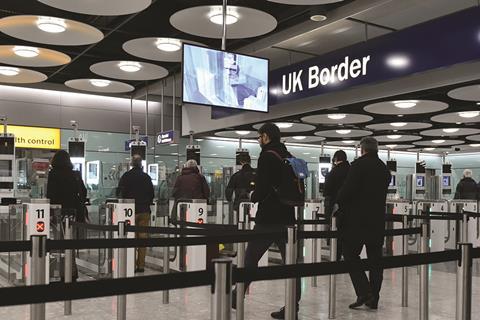Post-Brexit immigration system announced
Home secretary Priti Patel is launching a points-based immigration system today that will see the UK close its doors to unskilled workers and those who cannot speak English.
The new system, to take effect from 1 January 2021 and end free movement, will come as a blow to the construction sector, which relies on EU labour.

It will assign points for specific skills, qualifications, salaries or professions and visas will only be awarded to those who gain enough points. The overall level of migration will be reduced and there will be no specific route for low-skilled workers.
It is estimated that 70% of the existing EU workforce would not meet the requirements of the skilled worker route.
Patel said: ”We are ending free movement, taking back control of our borders and delivering on the people’s priorities by introducing a new UK points-based immigration system, which will bring overall migration numbers down.”
The system will treat EU and non-EU citizens equally and give priority to those with the highest skills. Workers will need to meet a series of criteria, including having specific skil levels and the ability to speak English, if they are to work in the UK.
Brian Berry, chief executive of the Federation of Master Builders (FMB), said: “We will need general labourers as much as architects or surveyors. They are a core part of the construction industry and it’s simply unrealistic to assume the domestic workforce will fill this gap in the next nine months.”
All applicants will be required to have a job offer and, in line with the Migration Advisory Committee’s recommendations, the minimum salary threshold will be set at £25,600.
Mark Reynolds, Mace CEO and lead of the Construction Leadership Council, said: “Led by the CLC, organisations across the sector have been investing heavily in developing local ‘homegrown’ talent for our industry.
“However, we still face a significant talent gap and, for the time being, must rely on being able to access the right mix of people and expertise from overseas to effectively meet the UK’s infrastructure and built environment requirements.”
This month Building revealed details of the “clearing house” system being drawn up to manage the future of migrant labour in the construction industry.
The initiative to keep access for European workers after the UK leaves the EU at the end of this year has been spearheaded by the Construction Industry Training Board, according to Philip Campbell, head of policy and public affairs at the FMB.
Reynolds also said that, despite this clarity from the government, “the new system is likely to make it harder for the UK construction sector to deliver the homes and infrastructure we so desperately need”.
In some better news for construction, the points-based system will at least expand the threshold for skilled workers. Those looking to live and work in the UK will need to be qualified up to A-level or equivalent, rather than degree level as under the current system.
The global talent scheme will also be opened up to EU citizens, which will allow highly-skilled scientists and researchers to come to the UK without a job offer. Student visa routes will also be points-based and opened up to EU citizens.
Those wishing to study in the UK will need to demonstrate that they have an offer from an approved educational institution, that they can support themselves financially and that they speak English.
Those EU citizens resident in the UK at 31 December 2020 can still apply to settle in the UK through the EU settlement scheme until June 2021.




























1 Readers' comment